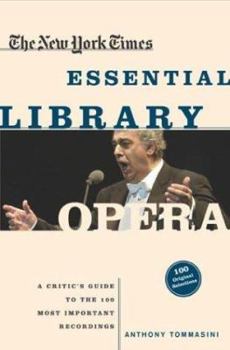The New York Times Essential Library: Opera: A Critic's Guide to the 100 Most Important Works and the Best Recordings
One hundred original essays on key opera recordings include a history of opera performance, profiles of top performers and conductors from the past century, and coverage of such works as La Boheme and... This description may be from another edition of this product.
Format:Paperback
Language:English
ISBN:0805074597
ISBN13:9780805074598
Release Date:November 2004
Publisher:Times Books
Length:336 Pages
Weight:0.90 lbs.
Dimensions:0.9" x 6.4" x 9.2"
Customer Reviews
4 ratings
New York Times Essential Library of Opera
Published by Thriftbooks.com User , 16 years ago
This is a fun book for both opera lovers and record collectors. I may disagree with some selections, but all in all sound advice, especially for the beginning collector. There are some major operas that are excluded, e.g., Gounod's Faust, and there are some new recordings of operas that should have been included, e.g., Decca's new recording of Massanet's Thais. But a fun book nevertheless. Ross Scimeca
Broadens the horizons
Published by Thriftbooks.com User , 17 years ago
This book is good for someone who, like me, loves opera but is hesitant about trying something new. As the author says, it includes "most" of the warhorses, but there are certainly omissions: I Pagliacci and Cavalleria Rusticana, for instance. On the other hand, there is a generous selection of lesser-known operas for those who want to branch out. The essays on the operas differ in quality. Some are largely plot summaries, others point to particularly stirring passages, others are anecdotal. They do succeed, though, in making you want to hear the music. I followed the author's advice about Les Troyens, and was delighted to discover how much this lesser-known work appealed to me. As for the CD recommendations, the only fault I can find is that the author seems to have stopped buying recordings in about 1976; at least, very few recordings from after the seventies make his list. He's also heavily biased toward certain singers -- as he freely admits, at least in the case of Tebaldi. Naturally, anyone who knows opera and has some familiarity with various recordings will find much to dispute in the choices, but as one resource among several, this book can certainly be recommended. If you're looking for something more comprehensive, have a look at the Rough Guide to Opera.
Elegantly Written and Unfailingly Interesting
Published by Thriftbooks.com User , 19 years ago
Books of opera synopses bore me to tears. And I wasn't expecting much here. But indeed Anthony Tommasini, the principal music critic of the New York Times, has not written that sort of book at all. He assumes that most readers will have some notion of what each opera is about and he writes of them from that perspective, focusing more on musical and dramatic aspects of the opera. He recommends his favorite CD recordings of the operas - and makes a comment that DVDs are new enough that there aren't DVDs of some of the operas he is writing about - and makes a case for each of them. He starts by giving some explanatory notes about such things as voice types, bel canto and recitative, and includes a little essay about why he chose the operas to include in his 'top 100.' He clearly is interested in proselytizing for some lesser-known and some modern operas (e.g., Copland's 'Tender Land,' Prokofiev's 'Betrothal in a Monastery,' Messiaen's 'Saint François d'Assise') that he feels have been ignored to some degree. Some choices are both surprising and exciting, such as Sondheim's 'Sweeney Todd.' He includes little-known facts that were new even to a grizzled opera-lover like this reviewer. And best of all he writes in a elegant and unfailingly interesting style. I found myself having trouble putting the book down. I tended to like the book at least partly because his enthusiasms mirror mine, but in those areas where we disagree he argued his points cogently. For instance, I am willing, after reading his essay about John Adams's 'Nixon in China,' to investigate it further. Tommasini writes for both the relative newcomer to opera and the operatic veteran. There is a dearth of technical terms, but when one is used it is gracefully and uncondescendingly defined. This is a book for the reader whose interest in opera is anything more than cursory. Scott Morrison
Useful and Enjoyable
Published by Thriftbooks.com User , 19 years ago
Written by Anthony Tommasini, the intelligent and articulate chief music critic of the New York Times, this book is aimed at individuals interested in exploring opera and building up a good opera CD library. Tommasini has picked out 100 important operas, written a short essay briefly describing each opera and commenting on what makes it important, and then recommending one or two good recordings. Tommasini's list includes the heart of the Italian and German repertoire plus quite a few others. He has taken this opportunity to do a bit of proselytizing for operas and causes he thinks important. Thus the inclusion of quite a few English language and American operas, but also some other surprises like the number of Russian operas including several Prokofiev and a couple of Rimsky-Korsakov operas. As with any matter of taste, this leads to some arguable choices. As a Britten enthusiast, I can't argue with the inclusion of so many Britten operas but I don't see the inclusion of Rimsky-Korsakov and the exclusion of Janacek's magical Cunning Little Vixen as sensible. On balance, Tommasini's desire to present opera as a living art form is laudable and his list justifiable. In terms of his CD recommendations, I can only say that I own several of the CDs he recommends and that I find myself in enthusiastic agreement with his choices.





